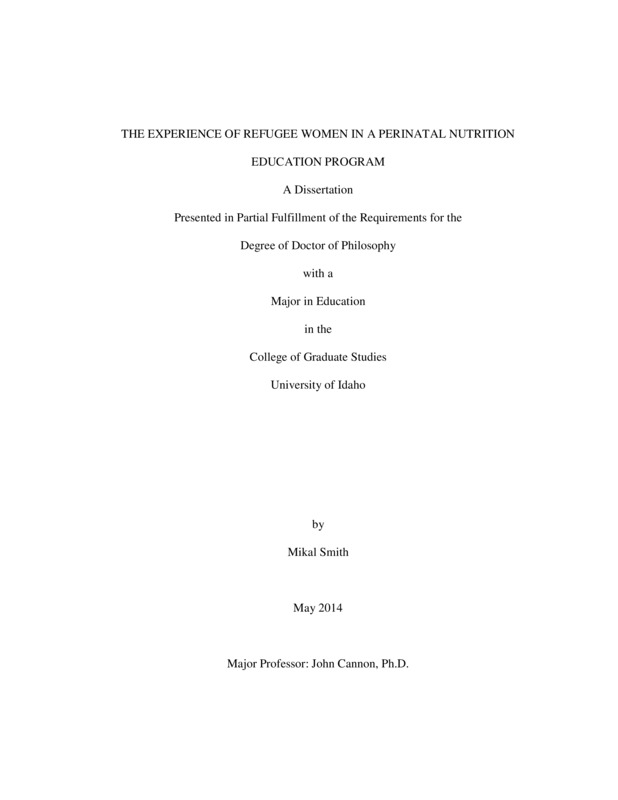The Experience of Refugee Women in a Perinatal Nutrition Education Program
Smith, Mikal Ann. (2014). The Experience of Refugee Women in a Perinatal Nutrition Education Program. Theses and Dissertations Collection, University of Idaho Library Digital Collections. https://www.lib.uidaho.edu/digital/etd/items/smith_idaho_0089e_10203.html
- Title:
- The Experience of Refugee Women in a Perinatal Nutrition Education Program
- Author:
- Smith, Mikal Ann
- Date:
- 2014
- Keywords:
- Cultural competence Nutrition education Refugees
- Program:
- Adult & Organizational Learning & Leadership - M.S. & Specialist
- Subject Category:
- Health education; Multicultural education
- Abstract:
-
Since 2000, refugees have come to the United States from more than 60 countries across the world (HHS, 2012). Once refugees arrive in the United States, their adjustment is affected by cultural, socio-economic, and literacy barriers (Baird, 2012; Frye, 1991). These barriers also may hinder their ability to practice healthy behaviors or seek healthcare for themselves and their children (Edberg, Cleary, & Vyas, 2011). The complexity of the experience is often compounded for refugee women (Deacon & Sullivan, 2009). Understanding and addressing the history, cultural values, and challenges refugee women face are essential in dealing with their healthcare concerns (Leininger & McFarland, 2002). Many programs strive to address health concerns in a culturally competent manner, responding to the specific healthcare needs of refugee women. However, these programs may not always meet their objectives due to misunderstanding and unintentional ethnocentric methods (Peek et al., 2010).
This study explored the experience of refugee women who are participating in a perinatal nutrition program. A conceptual framework guided the study that included aspects of Culture Care Theory (Leininger and McFarland, 2002) and Health Belief Model (Pender et al., 2002). This was a qualitative study, based on the ethnonursing research design, utilizing focus group interviews with refugee women who participate in a perinatal health education program related to diet and nutrition. Eight women who were pregnant or recently delivered a baby and who had participated in a nutrition education program participated in the study as key informants. The women were from 21 to 37 years of age and had from one to five children. Their countries of origin were located in the Middle East, Asia and Africa. General informants included a refugee woman who was familiar with the refugee population but had not attended the nutrition classes and four healthcare professionals who worked closely with refugee women. The four healthcare professionals included two registered nurses, a nurse practitioner and a social worker.
Two major theme clusters encompassed the participants' statements related to the women's experiences in the nutrition classes and their assimilation of the information learned at the classes. The first theme included culture care factors which affected their learning and diet choices. The factors addressed by the women were kinship and social factors, economic factors, education, religion, and factors related to environment or context. The second theme cluster focused on cues to action, perceived barriers, and perceived benefits to incorporating the recommended health behaviors. This cluster included what they viewed as relevant new information, the processes of the women utilized in learning new information and adapting their diets, their need to address their traditional choices and practices, and suggestions for improving the classes.
This study is significant in providing some insight into the experience of refugee women who attend perinatal education classes related to nutrition and diet and their beliefs and values, which influence diet choices. Implications related to this study included awareness of the factors affecting the women's learning about nutrition, their impact on the women's diet choices and healthy behaviors, and the role cultural proficiency can play in achieving better outcomes for this vulnerable population. Strategies for improvement of nutrition education among this population and increased advocacy were suggested. More research is needed to understanding the health needs of this group and the cultural factors impacting their health behaviors, as well as identifying teaching and learning strategies which are effective in addressing these topics.
- Description:
- doctoral, Ph.D., Adult & Organizational Learning & Leadership - M.S. & Specialist -- University of Idaho - College of Graduate Studies, 2014
- Major Professor:
- Cannon, John
- Committee:
- Kroth, Michael; Lichtenberger, Eric; Brooks, Melanie; Reis, Janet
- Defense Date:
- 2014
- Identifier:
- Smith_idaho_0089E_10203
- Type:
- Text
- Format Original:
- Format:
- application/pdf
- Rights:
- In Copyright - Educational Use Permitted. For more information, please contact University of Idaho Library Special Collections and Archives Department at libspec@uidaho.edu.
- Standardized Rights:
- http://rightsstatements.org/vocab/InC-EDU/1.0/

